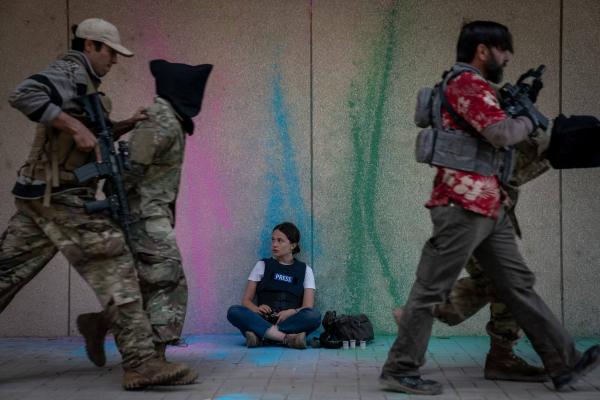Three weeks before the 2016 election, I sat in my friend’s backyard as he told me about the guns and ammunition he and his friends had stockpiled to take action after Hillary Clinton was elected to the presidency of the United States. None of that came to pass, but four years later, when insurrectionists swarmed the U.S. Capitol intent on overturning the election of President Joe Biden, I thought of my (by then former) friend and his ragtag militia. With another election on the horizon and one of the two presumptive candidates — former president Donald J. Trump — facing a bevy of criminal charges, those same threats of violence loom. Trump supporters and some GOP politicians have publicly stated that we’re headed for another civil war, the Atlantic devoted an entire magazine issue to “how to stop a civil war,” and after a white supremacist killed 23 people in El Paso, Texas, Princeton professor Eddie Glaude Jr. declared that we are in the middle of “a cold civil war.”
It’s into this milieu that writer/director Alex Garland released his new action-packed dystopian film Civil War. Set in the near-future U.S., Civil War imagines the end of a bloody conflict between the government and rebel factions. The film has proven to be divisive, in large part because its politics are relatively opaque. Civil War focuses less on the causes of division than the effects, and, by telling the story of the journalists who strive to be objective as they cover the war, interrogates what it means to faithfully bear witness to violence.
Especially for those churches who imagine ourselves to be a mediating middle path in a country where every issue has become sharply partisan, Civil War illustrates that objectivity ends where the suffering of vulnerable people begins. If the Church is to take any lesson from Civil War, it’s that justice demands we take a side. Jesus shows us which side: The Church must always stand with the most vulnerable, living in such solidarity that their suffering is our suffering and offering the same kind of non-violent resistance Jesus modeled.
The film opens in what will prove to be the final week of the war. Garland gives us precious little information about the cause of the war or even what the “sides” are. The states who have seceded seem to have done so at least in part to protest the sitting president (Nick Offerman) serving a third term (which violates the 22nd Amendment) and shuttering the FBI. Despite cries that Garland’s film is apolitical, both of these actions look a lot like ideas former president Trump has floated in the last year. He has both insisted he deserves a third term as president and called for the defunding of the FBI.
In the film, the U.S. has splintered into four factions: the New People’s Army to the Northwest, the Florida Alliance (which includes most Southern states), and the Western Forces, comprised of Texas and California, all work in concert to overthrow the President of the loyalist states. Again, the relationship among the three secessionist groups is unclear, as is what the president did that was shocking enough to unite the reddest and bluest of the states.
The film follows four journalists covering civil unrest in New York City as they rush toward Washington, D.C., to secure an interview with the president before the Western Forces depose him. Joel and Lee (Wagner Moura and Kirsten Dunst) work for Reuters and are leading the rush to D.C. They pick up Sammy (Stephen McKinley Henderson), who writes for The New York Times and has long been a mentor to Lee, and Jessie (Cailee Spaeny), a 23-year-old aspiring war photographer who idolizes Lee. The four set out in a white SUV with PRESS stenciled along the side, tracing a circuitous route to the nation’s capital through Pennsylvania and West Virginia. On this whirlwind tour, they bear witness to various responses American citizens have to the war. In these wildly various scenarios, they find the limits of their commitment to objectivity tested. Ultimately, they discover neutrality is impossible when human dignity is at stake.
Most American churches are aware of the political division. And while plenty of churches are still aligned with GOP politics (somewhere around 80 percent of white evangelicals voted for Trump in 2020), a growing group of evangelical leaders position themselves as centrists, employing the term “third way” to describe this neither-Republican-nor-Democrat political positioning. In recent years, the term has come to encompass a middle-ground approach to everything from immigration to LGBTQ+ rights. In the opening to his book, A Letter to My Congregation, which discusses evangelicalism and LGBTQ+ people, pastor Ken Wilson writes, “Our controversies seem to boil down to conservatives and liberals (or, if you prefer, traditionalists and progressives) ... What if there is another way to go about this? A new third way, a third option…?”
But when used this way, third-way thinking is dangerously limited; it requires a framework in which every issue is reduced to two opposing perspectives: We should have open borders or closed borders. Queer people have the right to marry, pastor, work, live, or they don’t. The U.S. is racist or it’s not. Once the binary has been established, the true and good always exist somewhere between the two positions, and the third-way Christian, the one not choosing a side, assumes the mantle of objectivity. It’s a tempting framework, one that promises “real” faith can always find a way to bridge any divide, so long as we stay above the fray.
Lee, a seasoned war photographer, strives to be objective at all costs, counsels Jessie to a similar objectivity after their first stop on their journey toward the capital. While Lee negotiates for gas — they pay with Canadian dollars, which are more stable than U.S. currency — Jessie, accompanied by one of the armed men, takes her camera to investigate what the men have done to the two looters they caught earlier. The looters hang, still alive, inside a drive-thru car wash. While Lee convinces the young man to pose with his prisoners, he laughs at Jessie’s obvious horror and invites her to choose whether the men should be executed or freed.
Once the journalists are back on the road, Jessie breaks down. She realizes that not only did she not ask for the prisoners’ freedom, but that she also didn’t take a single picture. As Jessie wonders whether she could have made a difference by intervening, Lee chides her. “Once you start asking yourself those questions, you can’t stop. So we don’t ask. We record so other people ask.” Don’t take a side; bear witness to the conflict. Turn off your compassion so you can tell the story.
Churches, too, aspire to that sort of non-partisan objectivity in the face of politics. Maybe a church wants to welcome both ICE agents and undocumented people. Or claim in the face of racial division that in Christ the only race is the human race. But is objectivity the goal of justice? Is God’s righteous path always a middle ground between two (manufactured) sides? Is this how we bear witness to the justice of God?
In Civil War’s most harrowing sequence, the journalists find themselves at the end of an assault rifle wielded by a man (Jesse Plemons) who doesn’t care about the neutrality proclaimed by their press passes. Instead, he asks them, “What kind of American are you?” The implication is that there is a single correct answer that will result in their freedom. But they don’t know which side of the conflict this man fights for. Though he seems very concerned about their American credentials, he’s not at all interested in liberty and justice for all. He is a stark reminder that some people are not interested in a civil conversation, or even a civil battle. They’re interested in winning at all costs. And, as Sammy warns, people like that don’t want their deeds documented — not by the light of a journalist’s flash (or a truth-telling, faithful witness, if I can riff on Jesus’ words in John 3:19-21).
Writer Robert Jones Jr., formerly known by his online persona “Son of Baldwin,” wrote, “We can disagree and still love each other unless your disagreement is rooted in my oppression and denial of my humanity and right to exist.” This is the line in the sand, the space where the church cannot afford the illusion of neutrality. As the journalists in Civil War discover, it’s only a matter of time before the person who denies the dignity of someone else turns on you, too.
In Civil War, Garland wants to focus on the personal cost of war journalism. What does it take to capture photographs of a man being burned alive and do nothing to intervene? How does one learn to hide their compassion behind the privilege offered by press credentials? Does the price of this journalistic sacrifice make a difference for those consuming journalism? Garland views this journalistic objectivity as an ideal to pursue; Lee is the film’s hero. Garland, himself a British filmmaker covering an American conflict from the outside, plays a role similar to that of Lee prior to the civil war: She made her career going to other countries to cover their conflicts.
As good as Civil War is — and the acting, the direction, the cinematography, the sound editing are all very, very good — it was impossible for me as an American to watch with the same apolitical objectivity. When a leader of one of the two parties in the U.S. system incited insurrection after losing an election and the other party did nothing to hold him accountable, when that person is now the de facto Republican candidate for president in the upcoming election, and when that candidate’s supporters are already threatening violence if he loses, a film that imagines both sides to be equally awful is at best naïve.
So too, the church cannot pretend to be above the fray, especially not when so much of the American church has contributed to the current state of affairs. As a white person, I cannot claim to be neutral regarding the suffering of Black Americans. As a cis-hetero pastor, I cannot remain neutral in the face of queer exclusion, particularly not when I know how the bigotry of Christians has contributed to the shockingly high rates of suicide in queer populations. As a U.S. citizen, I cannot remain neutral about the flood of migrants at our Southern border unless I ignore that so many of them have fled their homes because of the economic and political realities created by U.S. foreign policy.
The church has never been an outside, objective observer. We are the body of the one who left the throne of heaven to enter into our story, and we call that movement good news. Our call to follow Jesus remains the same: We must abandon our privileged thrones of objectivity and neutrality and live among the marginalized and vulnerable. Until their story becomes our story, we are not the church. What we need now is not an apolitical church, gliding serenely above the conflict, but an actively nonviolent church that wades into where the most vulnerable are struggling for their lives and make our stand with them. This is how we bear witness to the one who made his stand with us.
Editor’s note: This article was updated on April 25 to correctly identify a quote from Robert Jones Jr., who was previously known by his online persona, “Son of Baldwin.” An earlier version of the article misattributed the quote to James Baldwin.
Got something to say about what you're reading? We value your feedback!







